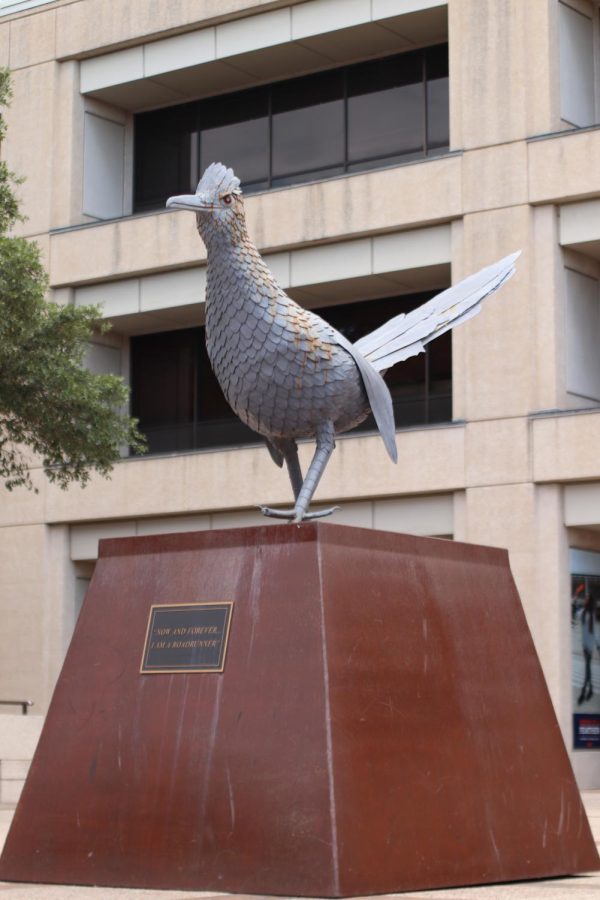UTSA resumes second in-person operations for Spring 2022 semester
Students support for University’s handling of Spring 2022 operations.
Students express support for UTSA’s decision to conduct three weeks online before returning to campus.
February 7, 2022
UTSA resumed in-person operations beginning Monday, Feb. 7, after conducting the first three weeks of the Spring semester online due to concerns about the Omicron variant. The Spring 2022 semester was the second consecutive semester that the university decided to follow this pattern of operations — three weeks online followed by resuming in-person activities.
The university’s decision was announced on Friday, Jan. 28, in an email to the student body.
“As we continue monitoring local COVID-19 trends, we are eagerly anticipating the return to in-person learning and our many spring semester traditions and experiences,” the email stated.
Overall, students expressed satisfaction with how the university handled operations for the new semester.
Junior Duncan Reedyk expressed the importance of conducting the first three weeks of the semester online to curb the spread of the new variant.
“I think any method of trying to control large groups of people getting together, especially on a college campus, is necessary to try and combat the pandemic. Last semester, I think UTSA did a pretty good job doing that, and this semester I think these first three weeks were kind of crucial to make sure that Omicron didn’t become bigger than it needed to be on campus,” Reedyk said. “I feel like the university is doing exactly what they need to do and they’re giving us the exact time frame that we should have based on those models that we trust.”
Junior Zachary Nepote also expressed support for the university’s decision.
“I personally think it’s a moral imperative for us to avoid a pandemic vs. me getting a class when I’m 20 years old, you know. There are more lifelong impacts to a pandemic than my college experience.”
“I think it just comes down to kind of what we wanna go through…I do, at the end, support the decision of the University because, you know, at the end of the day, we are trying to stop a pandemic and I personally think it’s a moral imperative for us to avoid a pandemic vs. me getting a class when I’m 20 years old, you know. There are more lifelong impacts to a pandemic than my college experience,” Nepote said.
Dani Garcia, a junior architecture major, expressed that the decision had good and bad consequences, adding that online instruction translates to a lack of beneficial hands-on experience.
“I’m indecisive between if it’s good or bad. It’s good that we’re safe, but then it’s kind of bad because, you know, some students like me, who’s an architecture major … I have to go to the studio and I have to do a lot of things that are hands-on, so I kind of lose out on [the] opportunity to do [things] in-person, that don’t let me benefit much,” Garcia said.
However, Garcia also felt like the university did the right thing. “I understand what [the University] mean[s], cause you know, it’s protocol, you know, we have to be safe, we have to protect ourselves and not get ourselves [into] danger, or else we lose a lot of lives in the end out of this and it’s very important to be protective at all cost[s],” Garcia said.
Graduate student Valeria Aguilar Rodriguez explained how the decision was beneficial. However, Rodriguez was quick to express a preference for in-person classes despite the convenience that online classes lend.
“It has been pretty good for me because I had the opportunity to study my first two weeks at home — I’m not from here, I am from Mexico. So yes, I could study at home for the first two weeks. And also, since I also work, it has been pretty convenient for me. Although, I would rather come back to campus because I prefer in-person classes,” Rodriguez said.
Andrew Neumann, a junior computer science major, explained that the university is trying to make the best decisions based on the state of the pandemic.
“I don’t like online classes. I want to be in person. I want to see people. I want to be able to talk to people. But, yeah, I mean, it’s making the best of [a] bad situation,” Neumann said.
Despite this, Reedyk expressed optimism, adding that the university is doing everything it can to make the best of the situation.
“I think in light of the restrictions that Governor Abbott has placed on institutions mandating masks, etc, I think we’re doing everything that we can,” Reedyk said.
Neumann echoed a similar opinion about how the university has handled pandemic-related decisions.
“I think [the university’s] hands are tied a lot, with obviously, they can’t require us to wear masks. They can’t require us to social distance, because that is the state decid[ing] that you can’t require people to be safe … I think they’re doing their best,” Neumann said.
Students further expressed mixed opinions about resuming in-person classes.
Junior Garcia pointed out the unpredictable nature of the virus.
“It can come anywhere, even when you’re safe or not. It’s sometimes not that great, cause usually it’s crowded and there’s [a] little bit of fear, but at the end of the day, I always remind myself that it’s going to be okay. I know myself. I just take my distance and I’ll be good,” Garcia said.
Nepote echoed a similar opinion, explaining that while it may not feel entirely safe to return to campus, many people on campus take appropriate safety measures.
“…I’m fully vaccinated. I have a mask. So, I’m really hoping for the best. And there are a lot of people on campus who do participate, like you know, with masking and getting vaccinated, so I’m really glad that the community is really banding together for this,” Nepote said.












